Over 30 years of anarchist writing from Ireland listed under hundreds of topics
Review
Book Review: Kristin Ross Communal Luxury: The Political Imaginary of the Paris Commune
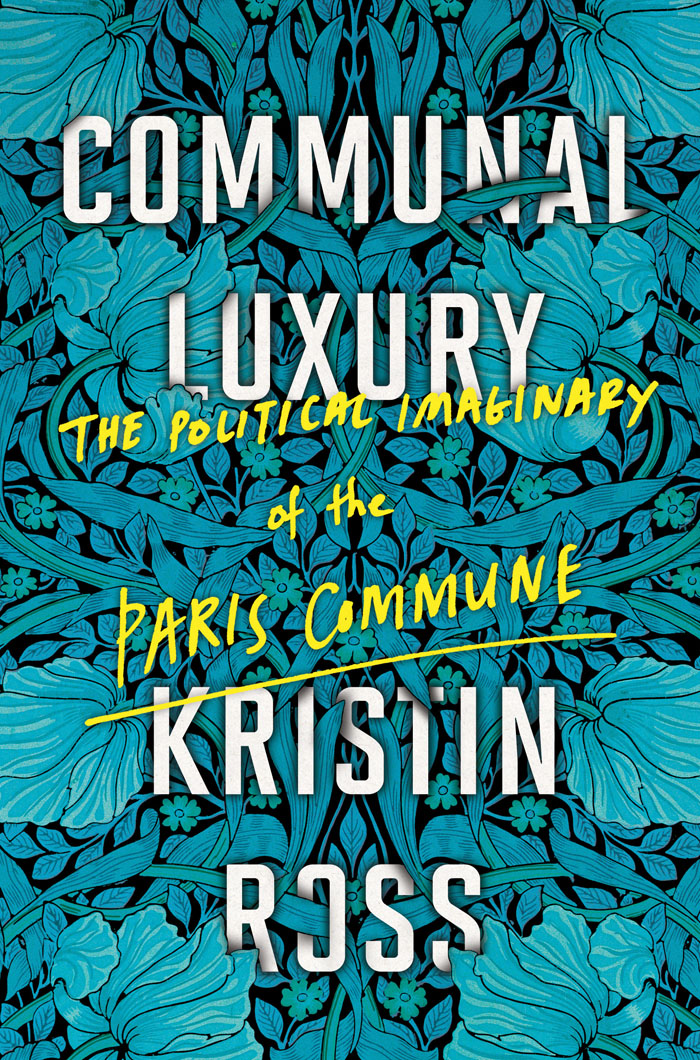
“Communal Luxury” takes as its subject matter the Paris Commune of 1871, one of the single greatest advances toward a free society ever attempted in human history. The Commune arose in the course of a devastating war between France and Prussia (Germany), with the French army’s defeat prompting the collapse of the imperialist, authoritarian French regime. The people of Paris organised their own defence, bought their own cannons, and refused to hand said cannons over to the new French Republic. Instead, staging a worker-led insurrection, they declared Paris to be liberated from both the French and Prussian forces and set about constructing a free society, one in which all comers participated in decision-making and all wealth was shared in common. The Commune lasted some 72 days in the spring of 1871 before being brutally crushed by the reactionary forces of Nation, Church, State and Capital. Some 25,000 men, women, and children were executed.
Ireland's Great Wealth Divide - A critical look at the David McWilliams documentary
Monday night (22/09/2015) RTE aired the misguided David McWilliams documentary "Ireland's Great Wealth Divide". It points out that the richest of the rich have far, far more than their fair share and that it's considerably worse than "we" think it is - this is demonstrated with opinion poll data (see image below) showing how Irish people would like wealth to be divided, contrasted against how "we" think it's divided and how it's actually divided. It also argues against the notion of trickle down economics, pointing out that the wealthy don't let their money trickle down and do not create jobs.

Murray Bookchin - The Next Revolution (Review)
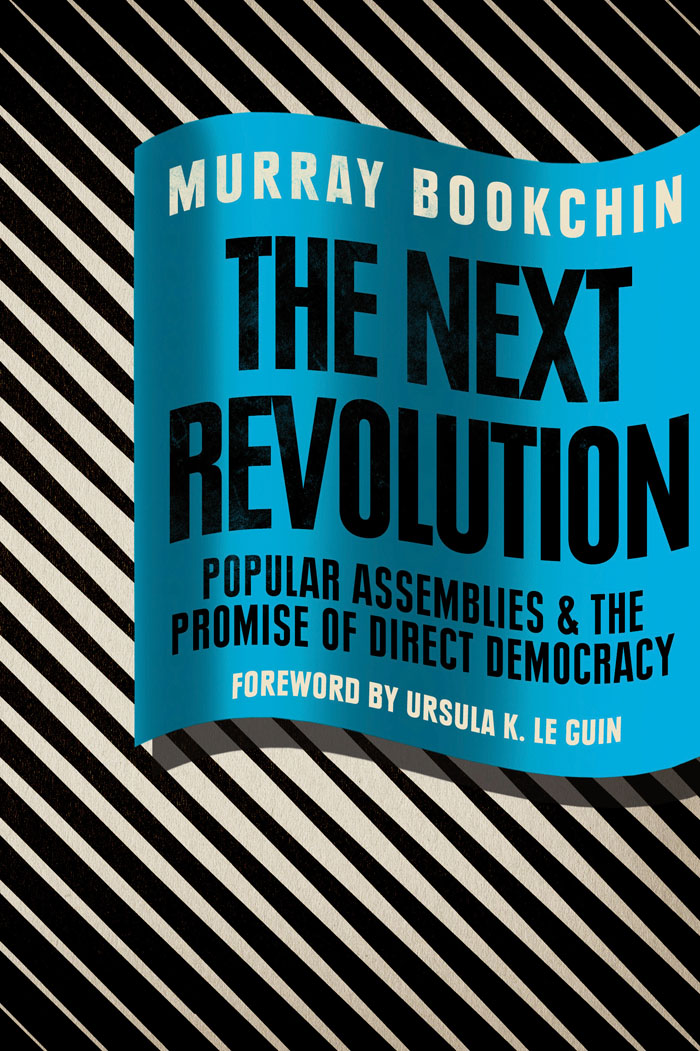 Despite being a pathbreaking figure from the 1960s onward in anarchist, green, and directly democratic political circles having predicted early on the significance of ecological issues and technology to leftwing social struggles Murray Bookchin today remains unknown to many on the left, and to those who do know of him he remains controversial.
Despite being a pathbreaking figure from the 1960s onward in anarchist, green, and directly democratic political circles having predicted early on the significance of ecological issues and technology to leftwing social struggles Murray Bookchin today remains unknown to many on the left, and to those who do know of him he remains controversial.
Disliked by class struggle anarchists and Marxists for his advocacy of community organising over workplace organising, and by anarchists involved in single issue activism for their lack of organisation and supposed concern with personal rebellion over social change, he made quite a few enemies in his last days for fiery polemics directed at his intellectual opponents. While his supporters in organisations like New Compass defend him for his consistency, others argue that he ended up alienating potential allies by refusing to ever waver on his specific revolutionary vision: focused on creating a municipal confederation of ecological communities practicing direct democracy, founded on a philosophy of science, reason, and humanism.
This new collection of essays from the last few years of his life may provide a useful entry point of his philosophical and political project called social ecology and generate further debate for the future of libertarian socialist organising in an age of increasing militarism and climate crisis.
One Month in Syriza Government - A Sobering Assessment from Greece
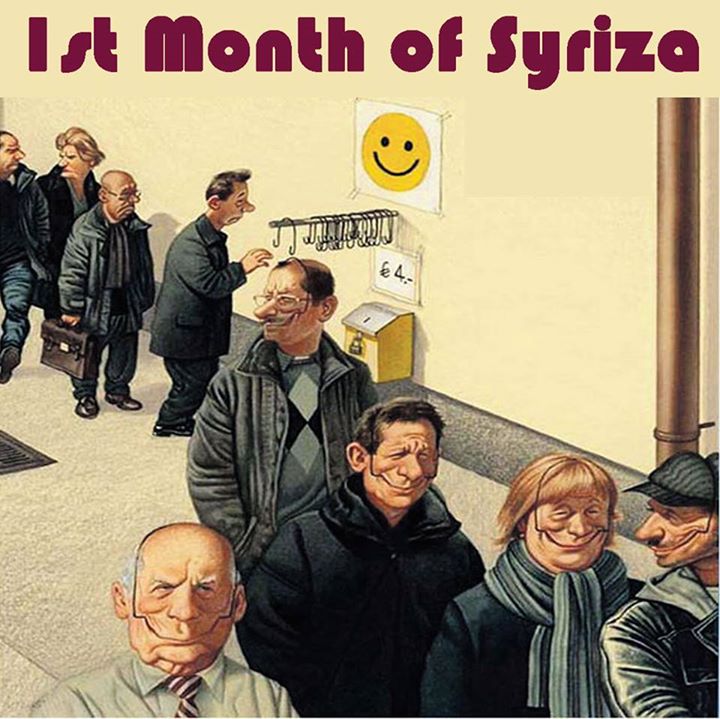 A lot of left reporting of Greece reduces us to spectators of a West Wing like show where we are required to unthinkingly cheer the good guys in their efforts to get one over through clever negotiation methods. We don't quite understand what is going on but we are required to believe our side are doing their best because they are the 'good guys'. And we like it when they appear to land a blow on the EU establishment. But does this drama tell us much about what is actually happening in Greece.
A lot of left reporting of Greece reduces us to spectators of a West Wing like show where we are required to unthinkingly cheer the good guys in their efforts to get one over through clever negotiation methods. We don't quite understand what is going on but we are required to believe our side are doing their best because they are the 'good guys'. And we like it when they appear to land a blow on the EU establishment. But does this drama tell us much about what is actually happening in Greece.
The Spirit of Anarchism? Book Review: Cindy Milstein, 2010, Anarchism and its Aspirations. Edinburgh: AK Press.

‘By anarchist spirit I mean that deeply human sentiment, which aims at the good of all, freedom and justice for all, solidarity and love among the people; which is not an exclusive characteristic only of self-declared anarchists, but inspires all people who have a generous heart and an open mind’.
Review: Silvio Federici's Caliban and the Witch – Women, the body and ‘Primitive Accumulation’
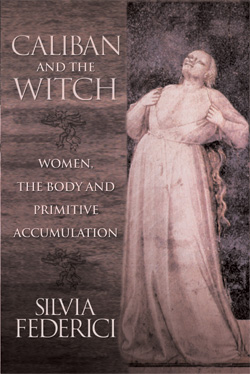
This piece of work is undertaken from the viewpoint of the seemingly invisible struggles of women against authoritarian rule, the historical erasing of women as being part of the wider social struggles for liberation against oppression, and indeed, providing a different type of revolutionary struggle in their own right instead of examining the effects of social reproduction and labour of women.
Futurism or the Future: Review of the Manifesto for an Accelerationist Politics
 The proliferation of computerised surveillance and security systems across workplaces has had the effect that now, in offices across the world, workers’ toilet usage is continuously monitored. You swipe your ID card to get in and out, producing a data event with a time and duration, which is quietly recorded by some computer.
The proliferation of computerised surveillance and security systems across workplaces has had the effect that now, in offices across the world, workers’ toilet usage is continuously monitored. You swipe your ID card to get in and out, producing a data event with a time and duration, which is quietly recorded by some computer.Did you know Oscar Wilde was an anarchist?
Though eminently quotable, there was more to Wilde than his turn of phrase and artistic flair. Many know his remark that 'to live is the rarest thing in the world. Most people exist, that is all', but few know its proper context. It is quoted from an essay entitled 'The Soul of Man Under Socialism' in which Wilde espouses his politics - those of libertarian socialism. Commonly understood as an apolitical aesthete, Wilde's radical political views are quite a well kept secret - like George Bernard Shaw's socialism, and to a lesser extent George Orwell's socialism. In fact, he signed Shaw's petition for a pardon of the anarchists arrested, and later executed, after the Haymarket Affair in Chicago, 1886. Wilde was a huge admirer of the famous Russian anarchist communist Peter Kropotkin, describing him in De Profundis as 'a man with a soul of that beautiful white Christ which seems coming out of Russia'.
Review: 100 Years Later: The Legacy of the 1913 Lockout.
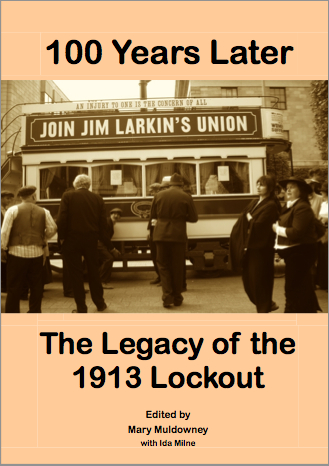 History has traditionally been viewed through the prism of ‘great leaders’ or ‘powerful men’ (and it usually is men). In recent years, however, the importance of community or local history – and the contributions of ‘ordinary’ people to great events – has been recognised. To paraphrase Jim Larkin “The great leaders only appear great because of the commitment, sacrifice and energy of ordinary people”.
History has traditionally been viewed through the prism of ‘great leaders’ or ‘powerful men’ (and it usually is men). In recent years, however, the importance of community or local history – and the contributions of ‘ordinary’ people to great events – has been recognised. To paraphrase Jim Larkin “The great leaders only appear great because of the commitment, sacrifice and energy of ordinary people”.Review: Iain M. Banks' The Culture series.
 When Iain Banks shuffled off this mortal coil in June of last year, sci-fi geeks in general and lefty sci-fi geeks in particular, mourned the fact that there wasn't a backup copy of his personality stored somewhere. In the universe he created in his acclaimed The Culture series of sci-fi novels, that almost certainly would have been the case. Transplanted into a new body, biological or artificial, or even brought back in virtual reality or as an adjunct to the mind of a Culture ship, he could have continued writing the books we've come to know and love for another few hundred years.
When Iain Banks shuffled off this mortal coil in June of last year, sci-fi geeks in general and lefty sci-fi geeks in particular, mourned the fact that there wasn't a backup copy of his personality stored somewhere. In the universe he created in his acclaimed The Culture series of sci-fi novels, that almost certainly would have been the case. Transplanted into a new body, biological or artificial, or even brought back in virtual reality or as an adjunct to the mind of a Culture ship, he could have continued writing the books we've come to know and love for another few hundred years.
